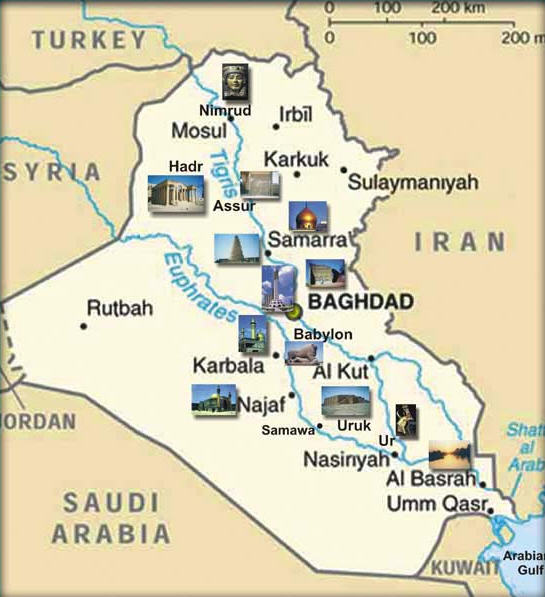 Official name:
Official name: Republic of Iraq
Capital: Baghdad
Geography
Area: 438,317 sq. km.
Cities: Capital--Baghdad (5.7 million). Other cities--Basrah, Mosul, Kirkuk, Sulaymaniyah, Erbil.
Terrain: Mostly broad plains; reedy marshes in the south with large flooded areas; mountains along the borders with Iran and Turkey.
Climate: Desert, mostly hot and dry.
People
Nationality:--Iraqi(s).
Population: 30,399,572.
Population growth rate: 2.399%.
Ethnic groups: Arab 75%-80%, Kurd 15%-20%, Turkoman, others approximately 5%.
Languages: Arabic (official), Kurdish, Turkoman (a Turkish dialect), Assyrian, Armenian.
Education: Years compulsory--primary school (age 6 through grade 6). Literacy 74.1%.
Location of Iraq
Nearly a landlocked country, Iraq is situated at the northern tip of the Arabian Gulf. Its coastline along the gulf is only 30 km long. The country is bound by Turkey on the north; by Iran on the east; by Saudi Arabia, Kuwait, on the south; and on the west by Jordan and Syria.
Iraq's two largest ethnic groups are Arabs and Kurds. Other distinct groups are Turkomans, Chaldeans, Assyrians, and Armenians. While Arabic is the most commonly spoken language, Kurdish is spoken in the north, and English is the most commonly spoken Western language.
Small communities of Christians, Jews, Bahais, Mandaeans, and Yezidis also exist.
Map of Iraq
The northern portion of Iraq, known as Al Jazira, is mountainous and borders with Iran and Turkey. Then it slopes down to sea level towards the southeast. Farther south, the country slopes downward to form a broad, central alluvial plain, which encompasses the valley of the Tigris and Euphrates rivers, the two main rivers of Iraq.